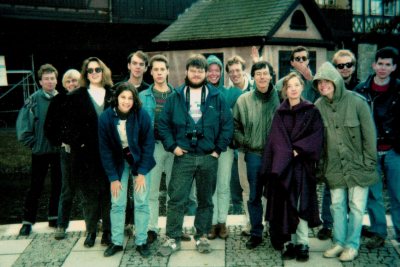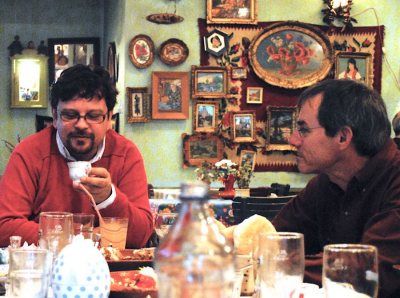In memoriam Craig Decker
Memorial tribute for Professor of German Craig Decker (1956-2018)
In a March 1938 letter to a fellow dramatist, Austro-Hungarian novelist and playwright Ödön von Horváth wrote:
“It does not matter whether we see the victory of our work or even its acknowledgment – as long as our work stays devoted to truth and justice.”
Forty years later, those lines were used by a young student scholar as the epigraph of his 1978 Bates Honors Thesis, “The Emergence and Overcoming of Egoism in the Works of Ödön von Horváth.”
That young student-scholar earned Highest Honors for the thesis, and would, over the next four decades, author 10 scholarly reviews, 5 reference entries, translate 7 short stories and 4 books, contribute chapters to 5 more scholarly editions, write 9 peer-reviewed articles, edit 3 books, and for three assiduous years serve as the editor of the peer-reviewed journal, Modern Austrian Literature. That student was our colleague and friend, Craig Decker.
At Bates, Craig studied German and Spanish, read widely, enjoyed informal political discussions, and played kazoo in the Bates marching band. He traveled on a Bates sponsored short term program to Cuernavaca, Mexico, spent a summer at the Goethe Institute in Murnau and spent his junior year in Munich. After graduating summa cum laude with highest honors in German, and receiving the Rodney F. Johonnot and Gilbert-Townsend Graduate Fellowships, Craig headed west to the University of California, Irvine to continue his studies. There, he earned his Ph.D. in German Literature in 1986 with a dissertation on the Austrian popular drama, the Volksstück.
As an ABD, Craig taught one year at Oregon State University, before returning to Bates in 1984 with his wife Susanne Fetherolf, Bates class of ’77. In the process of completing his Ph.D. and earning tenure in 1992, he and Susanne also welcomed into the family their two children, Andrew and Grace, whose wellbeing became one of the focal points of his life.
In his 34 years at Bates, Craig received 16 grants and awards, including a Phillips Faculty Fellowship in 2012, and served many terms in various department and program chair positions. He taught German courses at all levels and designed and taught on topics ranging from the history and theory of popular drama to courses on living with the Nazi legacy and Austrian fascism.

Prof. Decker with his Fall Semester Abroad students on the trip to Erfurt on October 12, 1992. Photo: Craig Decker’s archive.
As an undergraduate and later as a graduate student, Craig developed an appreciation for study abroad. This passion continued after his return to Bates, where he organized and directed numerous short term and fall semester programs to Austria and Germany. His Fall Semester Abroad programs to Vienna set standards for integrating language, literature, culture, history, and politics. Those trips offered students memorable experiences including face-to-face meetings with contemporary literary figures, trips to Vienna’s cultural landmarks, and a rare visit to proceedings at the War Crimes Chamber of the Court of Bosnia-Hercegovina.
He served many years on the Off-Campus Study Committee, but his commitment to study abroad was part of a much broader, career-long educational philosophy. Whether it involved bringing Maine high school students to Bates for an annual German day, or his 30 years of service to the Junior Year in Munich Program, Craig encouraged contact with German-speaking communities near and far, and was himself a passionate traveler and conversationalist who loved reconnecting with old friends, making new ones, and could pass hours in discussions on art, literature, politics, and sports. The relevance of such contact is realized throughout Craig’s scholarship: from a chapter on teaching advanced German and Austrian Culture in the AP German Language Teacher’s Guide to research on contemporary Austrian writers. A decades-long working relationship with Viennese novelist Peter Henisch resulted in numerous scholarly papers and translations of Henisch’s Stone’s Paranoia and A Very Little Woman, the latter a novel in which Craig himself appears as a minor character. As part of his Phillips Fellowship, Craig prepared meticulously for a translation of award-winning, Russian-born author Vladimir Vertlib’s novel Way Stations by retracing the author’s European migrations from St Petersburg, Russia to Vienna. At the time of his death, Craig was translating Austrian writer, Robert Menasse’s The Capital, winner of the 2017 German Book Prize.
Entrusting their works to his talent as a translator is a clear indication of the respect these contemporary authors had for Craig, an attitude shared by his peers in German Studies and our students as well. In Craig, students found a careful, attentive reader who encouraged and mentored them through the difficult process of writing in a second language:
“I knew my paper would require some revision… I did not anticipate the three or four rounds of editing that would follow,“ wrote a student, recalling her first paper in German, “…it was through this process that I first saw Craig’s incredible ability to push and guide his students as far as they wanted to go in their studies.”
Students we heard from reminisced fondly about Craig’s quirky habits in the classroom, such as the Falco songs he played on Friday afternoons, or his signature ‘Hallo Leute’ greeting. Yet more often than not, they remembered his dedication to their wellbeing. Whether it was his first semester at Bates inviting students whom he had just met to join him and Susanne for dinner, or decades later making sure a former student’s birthday would be celebrated even in Vienna, Craig was always mindful of the importance of personal connections.
“I was really grateful when Craig invited me over for dinner while Susanne and Grace were visiting from home. Little did I realize, he had also planned a birthday celebration for me, complete with cake and a few thoughtful and silly Empress Elizabeth trinkets that were reminiscent of my thesis.”
International students (who often take German) always felt a little closer to home when they stopped by to discuss courses or the challenges of college life in an unfamiliar environment far from home. One international student credits Craig with helping her through difficult times and encouraging her to stay and complete her degree at Bates. Years later, when her family learned that Craig would be visiting their home town as part of a study abroad program, the entire group was treated to an elaborate sitdown dinner at which the family expressed their appreciation for his steadfast support.
Throughout his years at Bates College, Craig remained true to his undergraduate motto. He never sought either “the victory of (his) work or even its acknowledgment.” He stolidly defended what he thought was true and just, and that is how he will be remembered by his friends, colleagues, and students.

